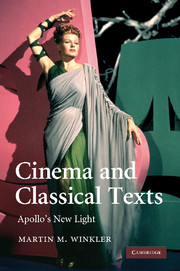Book contents
- Frontmatter
- Contents
- List of illustrations
- Acknowledgments
- ΦΟΙΒΩΙ ΑΠΟΛΛΩΝΙ ΦΩΤΟΚΙΝΗΤΗΙ
- Introduction: The god of light and the cinema eye
- 1 A certain tendency in classical philology
- 2 Divine epiphanies: Apollo and the Muses
- 3 The complexities of Oedipus
- 4 Patriotism and war: “Sweet and fitting it is to die for one's country”
- 5 Helen of Troy: Marriage and adultery according to Hollywood
- 6 Women in love
- Epilogue: “Bright shines the light”
- Bibliography
- Index
1 - A certain tendency in classical philology
Published online by Cambridge University Press: 18 August 2009
- Frontmatter
- Contents
- List of illustrations
- Acknowledgments
- ΦΟΙΒΩΙ ΑΠΟΛΛΩΝΙ ΦΩΤΟΚΙΝΗΤΗΙ
- Introduction: The god of light and the cinema eye
- 1 A certain tendency in classical philology
- 2 Divine epiphanies: Apollo and the Muses
- 3 The complexities of Oedipus
- 4 Patriotism and war: “Sweet and fitting it is to die for one's country”
- 5 Helen of Troy: Marriage and adultery according to Hollywood
- 6 Women in love
- Epilogue: “Bright shines the light”
- Bibliography
- Index
Summary
This chapter provides a theoretical overview of the similarities between classical scholarship and scholarship on the cinema. It is not my goal, nor would it serve any practical purpose, to delineate either the one or the other in its entirety or to discuss their obvious differences. Rather, I intend to provide those engaged in classical scholarship with a justification to turn to the cinema as an important complement to their work and as a means to illuminate classical texts from a contemporary perspective. Various modern approaches to antiquity in such areas as comparative literature, art history, political theory, feminism, psychoanalysis, history, and anthropology have yielded significant insights into ancient works and their cultural, aesthetic, and social contexts. There is then no reason to assume that the cinema could not also increase our understanding of the past and of its continuing influence on the present. Film, together with related media like television and the production of digital images, is now our chief means of storytelling and the most important heir to textual narrative; it also has a greater reach than any other medium of high and popular culture. The reception of classical art and literature has by now become inseparable from the ancient works themselves. Translations and creative adaptations of ancient texts have given strong impulses to the entire history of Western culture. In striking ways, the cinema exemplifies the continuing importance of classical works.
- Type
- Chapter
- Information
- Cinema and Classical TextsApollo's New Light, pp. 20 - 69Publisher: Cambridge University PressPrint publication year: 2009



